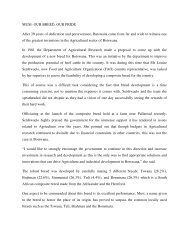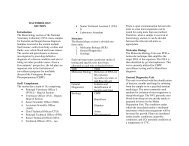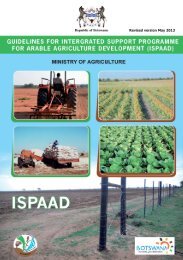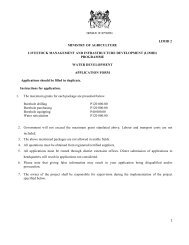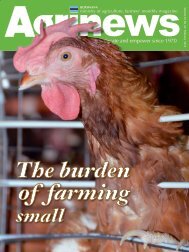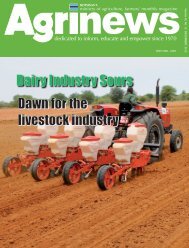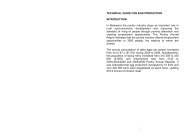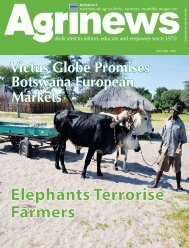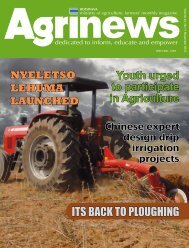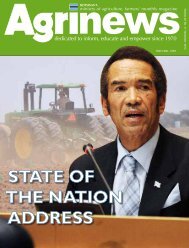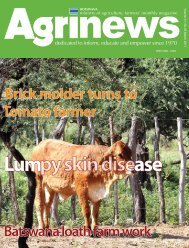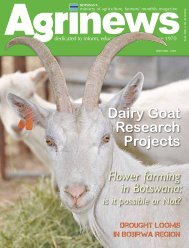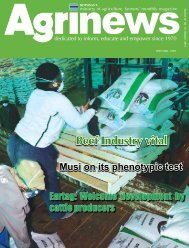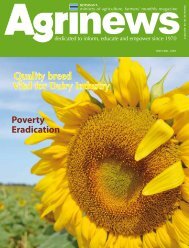Botswana's karakul renaissance - Ministry of Agriculture
Botswana's karakul renaissance - Ministry of Agriculture
Botswana's karakul renaissance - Ministry of Agriculture
Create successful ePaper yourself
Turn your PDF publications into a flip-book with our unique Google optimized e-Paper software.
LIVESTOCK AND<br />
MEAT INDUSTRIES ACT<br />
PROTECTS ALL PARTIES<br />
Dr Sehularo<br />
Article: Priscilla Nthaga<br />
Photo: Tshepiso Baipidile<br />
In their endeavour to sensitize butcheries<br />
and meat retailers on the provision <strong>of</strong> the<br />
Livestock and Meat Industries Act which<br />
amongst other things calls for inspection <strong>of</strong><br />
meat products for human consumption, the<br />
<strong>Ministry</strong> <strong>of</strong> <strong>Agriculture</strong> and that <strong>of</strong> Labour<br />
and Home Affairs in conjuction Barclays<br />
Bank, recently hosted a stakeholders<br />
workshop on Act.<br />
The workshop was <strong>of</strong>ficially opened by<br />
Kweneng District Commissioner, Mr. Moagi<br />
Kenosi, who said the act was enacted<br />
to ensure that all meat to be sold should<br />
be inspected to ascertain if it is in a good<br />
condition for human consumption. He<br />
further stated that the Act was also made to<br />
protect both the retailers and customers.<br />
He said the Act would go a long way in<br />
improving the quality <strong>of</strong> meat, adding<br />
that Batswana would be able tom eat the<br />
same quality <strong>of</strong> meat which the Botswana<br />
Meat Commission {BMC} exports to the<br />
European market.<br />
Mr Kenosi said Botswana is a meat eating<br />
nation so it is important that the meat eaten<br />
is <strong>of</strong> high quality.<br />
For his part the Agricultural Regional<br />
Coordinator for Kweneng Mr Kedikilwe<br />
Kedikilwe said the purpose <strong>of</strong> the workshop<br />
is to empower meat retailers and butcheries<br />
inorder for their businesses to prosper.<br />
The other purpose he said is to guide meat<br />
retailers and butcheries on slaughtering<br />
procedures and other methods required in<br />
meat inspection as well as giving them tips<br />
on how their meat could be rejected.<br />
Kedikilwe appealed to them not to resist<br />
change as they are likely to lose customers<br />
if they do so.<br />
Another purpose <strong>of</strong> the workshop was<br />
to teach butchers and meat retailers on<br />
handling and transportation <strong>of</strong> meat which<br />
he said that can be one principle that can<br />
attract customer to butcheries. He went on<br />
to say that temperature control after shelve<br />
life should be complied noting that during<br />
transportation more air should be allowed<br />
to circulate.<br />
Also speaking at the occasion was the<br />
Deputy Director <strong>of</strong> Veterinary Services Dr<br />
Kerapetse Sehularo who said Botswana has<br />
only 47 meat inspectors but needs at least<br />
150. He said Molepolole alone has adding<br />
57 butcheries and 244 000 livestock.<br />
He went on to reveal the core cluster<br />
responsibility <strong>of</strong> the Department <strong>of</strong><br />
Veterinary Services is animal health<br />
protection which entails responsibility<br />
for animal health, how the animals are<br />
to be handled when they are ailing. He<br />
also emphasised the importance <strong>of</strong><br />
communicating with the veterinarian<br />
before moving the animals from one place<br />
to another.<br />
He further stated that veterenary <strong>of</strong>fcials<br />
look at many issues before issuing a permit<br />
for animal movement, adding that some<br />
diseases can be detected on life animals<br />
while others can be found on meat.<br />
The other cluster, he said, is animal welfare<br />
protection which is basically how animals<br />
should be handled. Animals should be<br />
taken care <strong>of</strong>f, they should not be beaten.<br />
Dr Sehularo said that Botswana is praised<br />
for producing meat that is in good<br />
condition for human consumption and<br />
also how diseases such as Foot and Mouth<br />
are handled. He said when it comes to<br />
Foot and Mouth Disease {FMD) control<br />
Botswana takes the lead.<br />
Dr. Sehularo said the other cluster is Public<br />
Health Protection which deals with food<br />
safety and zoonoses.<br />
He said that the main purpose <strong>of</strong> the act<br />
is customer protection thus dictating<br />
that cattle are slaughtered in a hygienic<br />
environment to avoid food poisoning at all<br />
costs.<br />
It is also consolidates the control which<br />
includes licensing and revocation <strong>of</strong><br />
licensing when there is contravention <strong>of</strong><br />
standards, supervision and inspection<br />
<strong>of</strong> meat to ensure that only wholesome<br />
and safe meat is sold to the public under<br />
one authority (Department <strong>of</strong> Veterinary<br />
Services (DVS} The inspection by DVS will<br />
guarantee independent meat inspection<br />
and carcass grading as opposed to the<br />
current situation.<br />
Dr Sehularo said the primary responsibility<br />
<strong>of</strong> the operator is to ensure safety and<br />
suitability <strong>of</strong> meat for human consumption<br />
in accordance with regulatory meat hygiene<br />
requirements adding that consumers <strong>of</strong><br />
meat should protect meat by maintaining<br />
the temperature that the meat has when<br />
buying, saying it is dangerous to defrost<br />
meat and put it back to the fridge.<br />
He added that customers should be<br />
responsible for meat safety from the point <strong>of</strong><br />
sale to the point <strong>of</strong> consumption.<br />
He further stated the export facilities would<br />
be expected to meet domestic as well as<br />
importing countries requirements adding<br />
that importing requirement would strictly<br />
adhered to so as to protect the country’s<br />
human and livestock population and<br />
environment against biosecurity threats<br />
related to globalization<br />
Dr Sehularo went on to talk about meat<br />
handling and its transportation. He revealed<br />
that car transporting meat should be cleaned<br />
and the meat covered not placed in the floor<br />
<strong>of</strong> the vehicle and green <strong>of</strong>fers like intestines<br />
should not be placed on top <strong>of</strong> the red meat<br />
adding that intestines should be eaten as<br />
fresh as possible, if eaten after frozen the<br />
virus increases rapidly.<br />
He further said in covered vehicle there<br />
should be containers to store red meat.<br />
The interior areas <strong>of</strong> the vehicle should<br />
be done in a way that the meat cannot be<br />
contaminated and wall and floor should be<br />
corrosion existence. Cars should be sealed<br />
with silicon materials since it does not allow<br />
cockroaches to hide in between.<br />
Hard plastics containers that can be closed<br />
with light colours to identify dirt should be<br />
used since dark colours can hide dirt and also<br />
packaged meat should not be transported in<br />
the same car with unpackaged meat.<br />
For the store chilled meat in the fridge it is<br />
allowed to be transported within 24km not<br />
frozen, if frozen allowed to be transported<br />
100km not beyond, fresh meat should<br />
be loaded in 7 degrees Celsius or less in<br />
trucks, 4 degrees Celsius for chilled meat<br />
and -12 degrees Celsius for fresh frozen<br />
meat. Transporting unfrozen meat would be<br />
allowed if one can drive within an hour.<br />
Dr Sehularo said the exemptions <strong>of</strong> the<br />
facilities would be animals intended for<br />
slaughter for consumption within a single<br />
household, public gatherings (including<br />
weddings, funerals and celebrations) and<br />
butchers and retail shop would not be<br />
allowed to sell meat unless it comes from<br />
licensed operational abattoirs.<br />
to page 16 ><br />
May 2010



